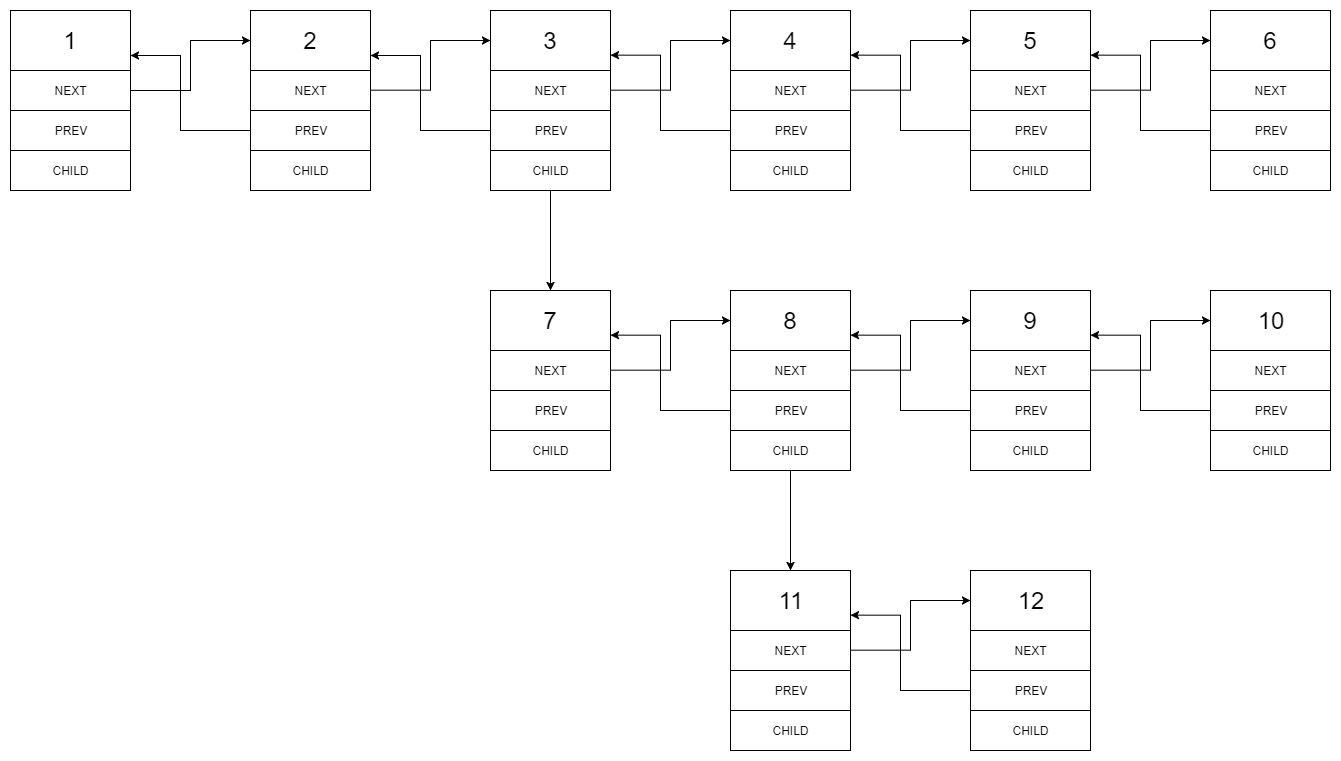430. Flatten a Multilevel Doubly Linked List
1. Question
You are given a doubly linked list which in addition to the next and previous pointers, it could have a child pointer, which may or may not point to a separate doubly linked list. These child lists may have one or more children of their own, and so on, to produce a multilevel data structure, as shown in the example below.
Flatten the list so that all the nodes appear in a single-level, doubly linked list. You are given the head of the first level of the list.
2. Examples
Example 1:
Input: head = [1,2,3,4,5,6,null,null,null,7,8,9,10,null,null,11,12]
Output: [1,2,3,7,8,11,12,9,10,4,5,6]
Explanation:
The multilevel linked list in the input is as follows:

After flattening the multilevel linked list it becomes:

Example 2:
Input: head = [1,2,null,3]
Output: [1,3,2]
Explanation:
The input multilevel linked list is as follows:
1---2---NULL
|
3---NULL
Example 3:
Input: head = []
Output: []
How multilevel linked list is represented in test case:
We use the multilevel linked list from Example 1 above:
1---2---3---4---5---6--NULL
|
7---8---9---10--NULL
|
11--12--NULL
The serialization of each level is as follows:
[1,2,3,4,5,6,null]
[7,8,9,10,null]
[11,12,null]
To serialize all levels together we will add nulls in each level to signify no node connects to the upper node of the previous level. The serialization becomes:
[1,2,3,4,5,6,null]
[null,null,7,8,9,10,null]
[null,11,12,null]
Merging the serialization of each level and removing trailing nulls we obtain:
[1,2,3,4,5,6,null,null,null,7,8,9,10,null,null,11,12]
3. Constraints
- The number of Nodes will not exceed
1000. - 1 <= Node.val <= 105
来源:力扣(LeetCode) 链接:https://leetcode-cn.com/problems/flatten-a-multilevel-doubly-linked-list 著作权归领扣网络所有。商业转载请联系官方授权,非商业转载请注明出处。
4. Solutions
主要的地方还是在dfs的时候检测到子节点,需要对下一个节点进行压栈,在子节点完了后,需要弹栈。对拼接的地方next和prev进行赋值。
class Solution {
public Node flatten(Node head) {
if (head == null) {
return null;
}
Stack<Node> stack = new Stack<>();
Node ans = head;
while (head != null) {
if (head.child != null) {
if (head.next != null) {
stack.push(head.next);
}
head.next = head.child;
head.next.prev = head;
head.child = null;
} else if (head.next == null && !stack.isEmpty()) {
head.next = stack.pop();
head.next.prev = head;
}
head = head.next;
}
return ans;
}
}